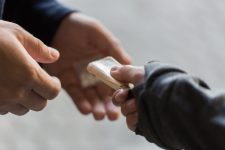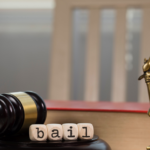Caught in Possession of Drugs? What Now?

The last decade has seen a rise in the number of police officers deployed at festivals and events across NSW.
The sight of sniffer dogs at live music events is commonplace, and the annual Nimbin Mardi Grass festival, which was set up to protest against cannabis being classed as an illegal drug, always attracts a large police presence.
Held earlier this month in the northern NSW town, the Nimbin festival resulted in 70 people being searched, with 24 charged with possession of a prohibited drug and five with supply of a prohibited drug.
You may have found yourself in this very situation, being searched and caught in possession of drugs at an event or festival.
It’s helpful to know what happens after you’ve been charged, what the consequences might be, and how you can get the best possible outcome.
The offence of drug possession in NSW
Section 10 of the Drug Misuse and Trafficking Act 1985 (NSW), outlines the offence of possession of a prohibited drug which carries a maximum penalty of two years imprisonment and/or a fine of up to $2200.
A person will be in ‘possession’ of an prohibited drug if:
- An illegal drug was in their ‘custody’ or ‘control’, and
- The person knew that they had custody or control of a prohibited drug.
If a person is in possession of a “traffickable quantity” of an illicit drug, they may also be charged with various supply offences under the Act, unless they prove the drug was in their possession for purposes other than supply.
A “traffickable quantity” is:
- 300 grams or 5 plants for cannabis.
- 3 grams for cocaine.
- 3 grams for heroin.
- 3 grams for methamphetamine (“ice”).
- 3 grams for ecstasy.
What are the penalties?
The amount of prohibited drug in your possession can determine whether you will be charged summarily in the local court, or on indictment in the district court.
The following quantities are dealt with in the local court:
- Meth/Amphetamine, cocaine and heroin: 1 gram or less.
- Cannabis leaf: 30 grams or less.
- MDMA (ecstasy): 0.25 grams or less.
This means the maximum penalty you face is two years in prison.
However, there are more options for penalties that don’t involve prison, including fines, good behaviour bonds, suspended sentences or community service orders.
The larger the quantity found in your possession, the more serious your crime.
If the amount is greater than the small quantity, your case is more likely to be heard in the district court.
This means you face tougher penalties, including lengthier terms of imprisonment.
The penalty for commercial quantities includes up to 20 years in prison.
What is definition of possession?
In law, being in possession of something is different from the everyday definition.
The essence of the concept of possession is that, at the relevant time, you had possession, custody or control over the drugs in question.
You don’t need to have the item on your person, such as in your hand, pocket, or wallet.
If the prohibited drug is found in your car, for example, the drug may be considered to be in your possession (even though the drug is not found on your person).
If the prohibited drug is found in your wallet, which is found on the ground, then the drug may also still be considered in your possession.
Now, if something has been slipped into your wallet or car without your knowledge, you are not regarded as being in possession of it.
This is because you did not have knowledge of the possession, nor were you reckless to the possibility that you possessed it.
If this has happened to you, it is important to get a good criminal lawyer to fight to have the case dropped, or to fight for you in court if the case goes all the way to a defended hearing.
What happens after you are charged?
When you have been charged by police, you will be issued with a Court Attendance Notice.
That Notice contains the date and location of the court you are required to attend.
What can you do to help yourself?
It’s a good idea to consult a criminal lawyer who is experienced in defending drug matters as soon as possible.
A top criminal defence lawyer can make a huge difference in your case.
If you have been charged with a trafficable amount, for example, even though you never intended to supply the drug, a defence lawyer may (depending on the amount and your prior conviction record) be able to push for the charge to be dropped or negotiate and have the charges reduced.
If you wish to plead guilty, there are a number of other things you can do to present your case in the best light.
It’s important to show the court you have taken the matter seriously by attending rehabilitation programs, if appropriate.
You can also highlight your good character to the court.
Do I plead guilty?
Your plea is up to you.
But it is advisable to get legal advice as soon as possible and always before entering a plea.
If you plead guilty on the first court date, you will be entitled to a significant discount on your penalty – which basically means that you will be treated much more leniently if you went all the way to a defended hearing and were unsuccessful.
If you indicate a ‘not guilty’ plea on the first court date, the court will set the case down for a hearing some months down the track – where the witnesses will attend court and the magistrate will decide whether you are guilty or not guilty.
Although drug possession is a type of charge where police are not normally required to serve the evidence before the hearing date, you or your lawyer may seek to subpoena that material. If the evidence is weak or you have a valid defence, a letter may be sent to the prosecution formally requesting that the charge be withdrawn. This letter is called ‘representations’ and, if successful, will save you the time, stress and expense of having to go through a defended hearing.
It is important to keep in mind that police must prove the charge against you to a standard of beyond reasonable doubt.
However if you do plead guilty, it is just as important to prepare for your sentencing hearing as it is for a defending hearing.
If you are pleading guilty to drug possession or small drug supply, it may be possible for your lawyer to help you avoid a criminal conviction altogether by getting a ‘section 10 dismissal or conditional release order’.
Being charged with drug offences can have serious consequences, including prison.
If you have attended a live music event or other type of festival and have been searched and charged by police, it’s important to get expert legal advice as soon as possible.






